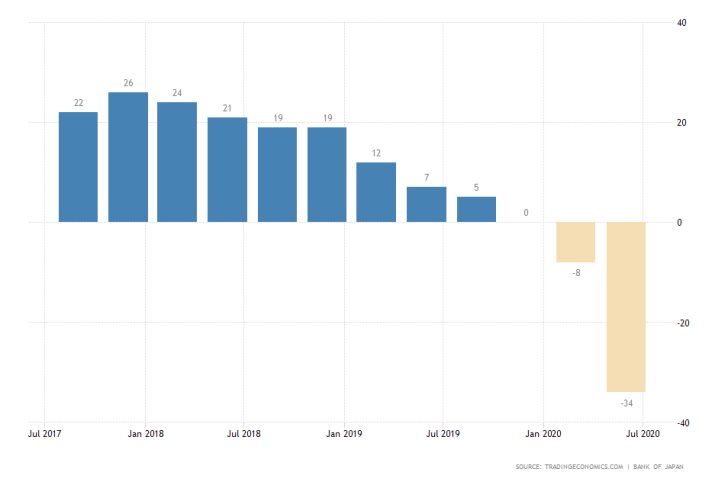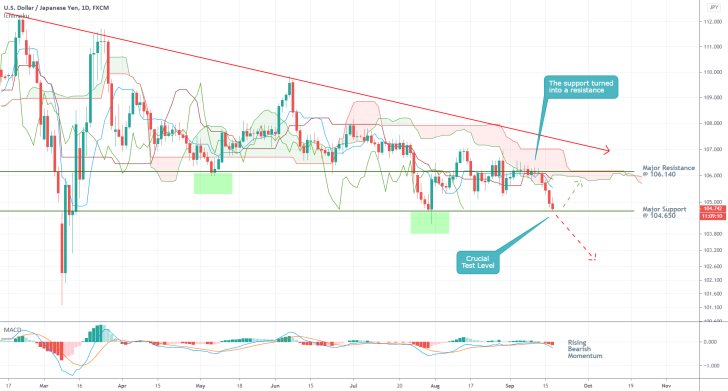
At its monetary policy meeting earlier today, the Policy Board of the Bank of Japan decided to maintain negative interest rates amidst tight economic conditions and protracted recovery. Thus, the Policy Rate remains unchanged at -0.10 per cent.
The Board alluded to very few positive developments since its previous meeting, chiefly a pick-up in global economic activity. Meanwhile, downbeat prospects for recovery in Japan have compelled the Board to maintain an exceptionally accommodative monetary policy stance.
"The Bank will purchase a necessary amount of Japanese government bonds (JGBs) without setting an upper limit so that 10-year JGB yields will remain at around zero percent. […] The Bank will actively purchase exchange-traded funds (ETFs) and Japan real estate investment trusts (J-REITs) for the time being so that their amounts outstanding will increase at annual paces with the upper limit of about 12 trillion yen and about 180 billion yen, respectively."
The BOJ cited muted inflationary pressures due to low oil prices as one of the primary reasons for the current weak price stability, drawing parallels with FED's comments from yesterday.
Dampened prospects for robust recovery continue to stave off a much-needed pick-up in business investment in Japan, which continues to represent one of the most substantial challenges for the BOJ.

As can be seen on the chart above, business confidence has been falling steadily since July of 2017. The sudden advent of the coronavirus crisis this year exacerbated pre-existing woes for Japanese businesses stemming from the trade war between China and the US.
"Financial conditions have been accommodative on the whole but those for corporate financing have remained less so, as seen in weakness in firms' financial positions. On the price front, the year-on-year rate of change in the consumer price index (CPI, all items less fresh food) is at around 0 percent, mainly affected by the past decline in crude oil prices. Inflation expectations have weakened somewhat."
This persisting problem has prompted BOJ members to preserve their accommodative monetary policy stance, which has strengthened the yen.
As can be seen on the daily chart below, the USDJPY is currently testing the major support level at 104.650, which has been prevalent since the aftermath of the initial coronavirus crash.
The Ichimoku Cloud indicator signals that the underlying market sentiment remains ostensibly bearish.
Nevertheless, the recent strengthening of the dollar could prompt a temporary rebound from this historic support. Such a course of action could develop a new pullback towards the major resistance level at 106.140.

Trendsharks Premium
Gold is undergoing a correction, as investors take profits to offset losses from falling stock prices, impacting their margins. However, we anticipate a renewed wave of [...]
The Swiss stock market index is mirroring its global counterparts, such as Germany 40 and US100, experiencing a sharp decline following the announcement of new [...]
We’re analyzing the weekly chart to grasp the broader market trend. Over the past three years, the US30 index has surged by 17,000 points, often resembling a nearly straight [...]
Over the past week, the DAX has experienced a sharp decline, plunging by an astonishing 3,400 points. This downward movement is not isolated, as its international counterparts, such as the UK100 and US100, are also facing significant [...]
EURUSD recently formed a double top at 1.0930, signaling a potential trend reversal, and has since begun a correction. After a 600-pip rally since early March, a pullback at this stage is both expected and healthy. Given these conditions, we are placing a [...]
Since early March, EURJPY has surged nearly 1,000 pips, providing us with several excellent trading opportunities. However, as the rally matures, many early buyers are beginning to take profits, leading to a noticeable slowdown in the uptrend. On Friday, the pair formed a [...]
The AUDJPY currency pair continues to be dominated by bullish momentum, as multiple golden cross patterns reaffirm the strength of the ongoing uptrend. Despite this, we are witnessing a much-needed [...]
The EURAUD currency pair appears to be undergoing a trend reversal, signaling a potential shift in market direction. A notable technical development is the formation of a Death Cross on the chart, a widely recognized bearish indicator that typically suggests a [...]
After securing an impressive 200-pip profit last week, the EURJPY currency pair is now undergoing a southward correction, retracing some of its recent gains. Despite this temporary pullback, the Golden Cross remains intact, reinforcing our view that the overall trend continues to be [...]
The appearance of a Golden Cross in Silver strengthens our analysis that the metal is currently in a strong uptrend, indicating further bullish momentum in the market. This technical pattern, where the short-term moving average crosses above the [...]
This trade presents a considerable level of risk and can be classified as an opportunistic move based on recent price action. The GBPUSD currency pair has experienced a substantial bullish rally, surging by nearly 500 pips in a strong upward movement. However, after this extended period of appreciation, the pair is showing signs of a potential [...]
The anticipated Death Cross on the SMI20 appears to be failing as price finds strong support at the 23% Fibonacci retracement level. After testing this area, the index has shown bullish strength, printing several large green candles, signaling an increase in [...]
A Golden Cross has just appeared on the USDJPY chart, signaling a potential bullish move. This technical pattern occurs when the 20 period moving average crosses above the 60 period moving average, a widely recognized indication of increasing [...]
After 2 months of a down trend, we finally see some indications of price recovery for Oil. The golden cross, a historic buy signal, supports this [...]
For the past month, the German DAX40 has experienced a remarkable 10% surge, reflecting strong bullish momentum. Despite ongoing market volatility and frequent pullbacks, every dip continues to attract fresh buyers, reinforcing the [...]
Oil continues its downward trajectory, despite occasional pullbacks. The overall trend remains bearish, reinforced by multiple Death Cross patterns, a classic sell signal indicating further weakness. Adding to this bearish outlook, the critical [...]
Over the past few days, gold has experienced a sharp decline of more than $100. This downturn can be attributed in part to traders securing profits to manage their margins, which are under strain due to the significant drop in major indices. Currently, gold has fallen below the [...]
The NASDAQ 100 index is showing strong bullish momentum, as evidenced by the formation of a Golden Cross on the chart. This classic buy signal occurs when the short moving average crosses above the long term moving average, suggesting that upward momentum is [...]
The EURAUD currency pair has encountered a significant resistance level, failing to break above the critical 61% Fibonacci retracement level. This suggests that bullish momentum is weakening, reinforcing the case for a potential downward move. Given this technical setup, we favor entering a [...]
The UK100 is experiencing a remarkable rally! Over the past few weeks, the British stock market index has surged nearly 800 points. Each minor dip has attracted more buyers, fueling the bullish momentum. However, since last week, we’ve observed a slight [...]




















